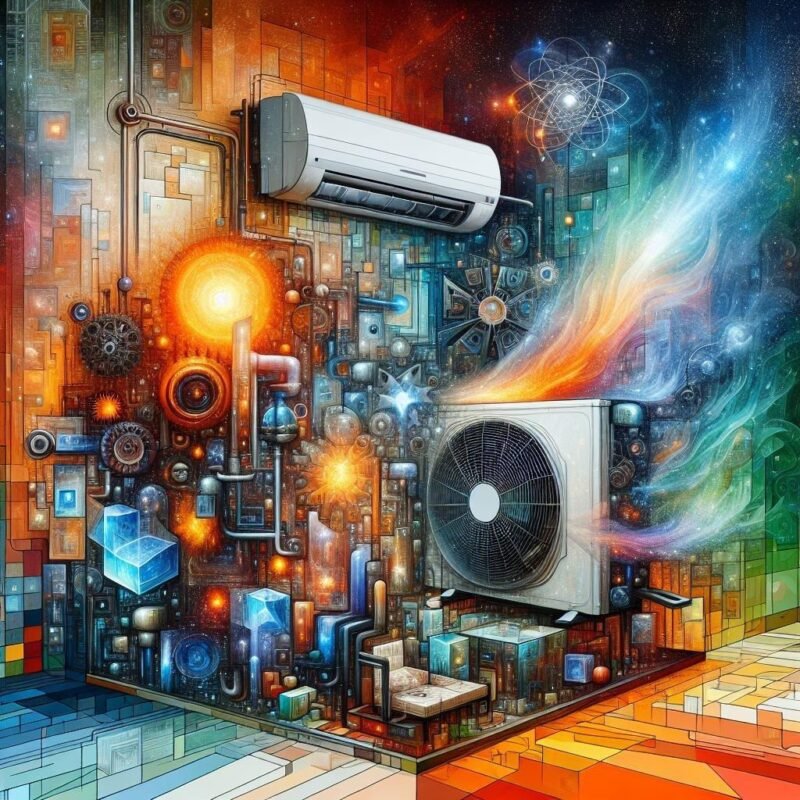How does the indoor unit distribute the conditioned air throughout the room?

Ever wondered how that magical box mounted on your wall transforms a stuffy room into a cozy haven? Picture this: you’re sitting in your living room on a scorching summer day,and suddenly,a gentle breeze of cool air dances around you,reaching every corner of the space.It’s not magic – it’s the genius of your air conditioner’s indoor unit working its charm. Let’s dive into the fascinating world of air distribution and uncover the secrets behind this everyday comfort companion that keeps us cool in summer and warm in winter.
The Science Behind Your AC’s Gentle Air Dance
Ever wondered how your AC unit orchestrates that perfect breeze throughout your living space? it’s like conducting a symphony of cool air, where multiple components work in harmony to create an ideal atmosphere.The indoor blower unit houses a complex fan system that pulls warm air through the return vent, processes it through cooling coils, and then releases it back into your room through carefully designed louvers that automatically adjust their position to optimize airflow patterns.
These intelligent louvers perform an intricate ballet, sweeping side to side and up and down to ensure even distribution.Working alongside them, the variable-speed fan adapts its rotation to maintain consistent comfort levels, while special air deflectors help create a Coanda effect – a phenomenon where cool air clings to your ceiling before gently cascading down the walls. This natural circulation prevents uncomfortable cold spots and drafts, transforming your room into a perfectly balanced surroundings.
| Airflow Pattern | Coverage Area | Comfort Level |
|---|---|---|
| Horizontal Sweep | Wide Rooms | Even Distribution |
| Vertical Flow | Tall Spaces | Quick Cooling |
Mastering airflow Patterns for ultimate Indoor Comfort
Imagine your AC’s indoor unit as an expert conductor orchestrating a symphony of cool breezes throughout your living space. The unit’s sophisticated louver system works in perfect harmony with its powerful fan, creating a multi-directional flow that reaches every corner of your room. By automatically adjusting the angle and direction of these vanes, modern units ensure that conditioned air doesn’t just drop straight down but rather creates a gentle cascade that evenly blankets your entire space.
The distribution magic happens through a combination of carefully engineered features working seamlessly together. Smart sensors detect temperature variations in different areas, while advanced motors adjust the airflow patterns to maintain consistent comfort levels. This intelligent system prevents the formation of hot or cold spots by:
- Automatically sweeping air from side to side
- Adjusting vertical angles for optimal reach
- Creating gentle vortexes that enhance air mixing
- Monitoring room occupancy for targeted cooling
| Airflow Pattern | Best For |
|---|---|
| Wide Angle | Open Living Spaces |
| focused Stream | Long rooms |
| Circular Motion | Square Rooms |
Smart Strategies to Maximize Your Indoor Unit’s Air Distribution
Optimal placement of your indoor air conditioning unit plays a pivotal role in achieving the perfect room temperature. position the unit on a wall that allows for unrestricted airflow, ideally at a height of 7-8 feet from the floor. Consider installing the unit opposite to the room’s most frequently used area, as this ensures the cool air reaches its intended destination effectively. Avoid placing furniture, curtains, or other obstacles directly in front of the unit, as these can impede air circulation and reduce cooling efficiency.
Enhance your unit’s performance by utilizing built-in features like adjustable louvers and fan speeds. Direct the horizontal louvers slightly downward at a 15-degree angle during cooling mode, as cold air naturally sinks. During heating mode, point them straight to allow warm air to rise naturally. configure the vertical louvers to distribute air evenly across the room, avoiding direct airflow onto occupants. Experiment with different fan speeds based on room occupancy and desired comfort levels.
- Use ceiling fans to complement air distribution
- Keep interior doors open for better air circulation
- Clean filters monthly for optimal airflow
- Consider room layout when selecting unit location
| Fan Speed | Best Used For |
|---|---|
| High | Quick cooling |
| Medium | Daily comfort |
| Low | Night operation |
Creating the Perfect Climate Zone with Strategic air Movement
Strategic placement of your AC’s indoor unit plays a pivotal role in establishing optimal comfort zones throughout your space.When the unit releases conditioned air, it follows a natural flow pattern, creating gentle currents that cascade across the room. These air movements are enhanced by the coanda effect, where the cooled air naturally clings to walls and ceilings, helping distribute temperature-controlled comfort to every corner.
The advanced louver systems in modern indoor units orchestrate this air distribution with precision, creating multiple pathways for conditioned air to reach various areas effectively. To maximize this air movement pattern, consider these key factors:
- Room layout and furniture placement
- Distance from frequently occupied areas
- Natural airflow obstacles and pathways
- Height and angle of installation
| Airflow Direction | Best For |
|---|---|
| Wide Angle | Open spaces |
| Focused Stream | specific zones |
| Oscillating | Even distribution |
Q&A
Q&A: How Does the Indoor Unit Distribute Conditioned Air Throughout the Room?
Q: What exactly is an indoor unit, and why is it important for air distribution?
A: Great question! The indoor unit is like the heart of your air conditioning system, keeping your space comfortable and cozy.It’s the part that sits inside your home, usually mounted on the wall or ceiling, and is responsible for taking the air that we want to condition—whether it’s warm in winter or cool in summer—and gracefully distributing it throughout the room. Without it, we’d be stuck with stale air instead of that refreshing breeze!
Q: How does the indoor unit actually work its magic?
A: Imagine your indoor unit as a mini weather station! First, it pulls in warm air from the room through its intake grilles. This air is then passed over cold evaporator coils (or warm coils,depending on the season) inside the unit. The coils work their cooling (or heating) magic, and voilà! The conditioned air is ready to be sent back into the room, transforming your space into a haven of perfect temperatures.
Q: What methods does the indoor unit use to distribute air effectively?
A: The indoor unit has a few tricks up its sleeve! Most commonly, it uses a fan to push the conditioned air through ductwork or directly into the room if it’s a ductless system. This fan creates airflow that can either be gentle and breezy or a little more robust, depending on your comfort needs. Some indoor units also use multi-directional louvers that can pivot to direct the air where you want it most—like toward your favorite reading nook or dance floor!
Q: Is there a secret formula for how the air stays even throughout the entire room?
A: Ah, if only it were that simple! Achieving even air distribution is all about balance. The design of the indoor unit,along with the placement of vents and the use of fans,helps mitigate cold spots and ensure that every corner of the room gets some love. Higher ceilings or larger spaces may benefit from larger or additional units to help keep things comfortable across the board. Think of it as a teamwork effort between your indoor unit and the room itself!
Q: What can we do to help our indoor unit distribute air more effectively?
A: you’re on the right track! Keeping your indoor space tidy goes a long way. Make sure that furniture isn’t blocking the airflow from vents or the unit itself. Clean the filters regularly to ensure efficient operation—think of it as giving your unit a little spa day! And if you notice some areas are still too hot or cold, you can always play around with fan speeds or the direction of the louvers to fine-tune that comfort.
Q: how do different types of indoor units affect air distribution?
A: Excellent point! There are different styles of indoor units—like wall-mounted, ceiling-mounted, or even portable—and each has its own strengths. Wall-mounted systems are great for ensuring consistent air flow across a room.Ceiling-mounted units can cover larger areas, distributing air evenly due to their elevated position. Portable units? They’re the underdogs, providing flexibility but may require a little more attention to airflow direction. Knowing the type of system you have helps in maximizing its strengths!
Whether you’re looking to beat the summer heat or ward off winter’s chill, understanding how your indoor unit distributes air can make all the difference in your comfort. After all, a well-conditioned room is a happy room!
wrapping Up
As we wrap up our exploration of how the indoor unit works its magic to distribute conditioned air throughout your space, it’s clear that this unassuming piece of machinery plays a pivotal role in crafting the perfect indoor climate. From the gentle whispers of airflow to the strategic placement of vents, every element combines to create a symphony of comfort that enhances our daily lives.
So, the next time you step into a perfectly cool room on a sweltering day or enjoy the cozy warmth on a chilly evening, take a moment to appreciate the intricate ballet of air movement happening around you. Your indoor unit is more than just a contraption; it’s your personal comfort companion, tirelessly ensuring you can relax or focus regardless of the weather outside.
Whether you’re tweaking your thermostat or ensuring your filters are clean,remember that a little attention goes a long way in keeping your home environment just the way you like it. Here’s to happy,comfortable living—and the unsung heroes behind it!






















